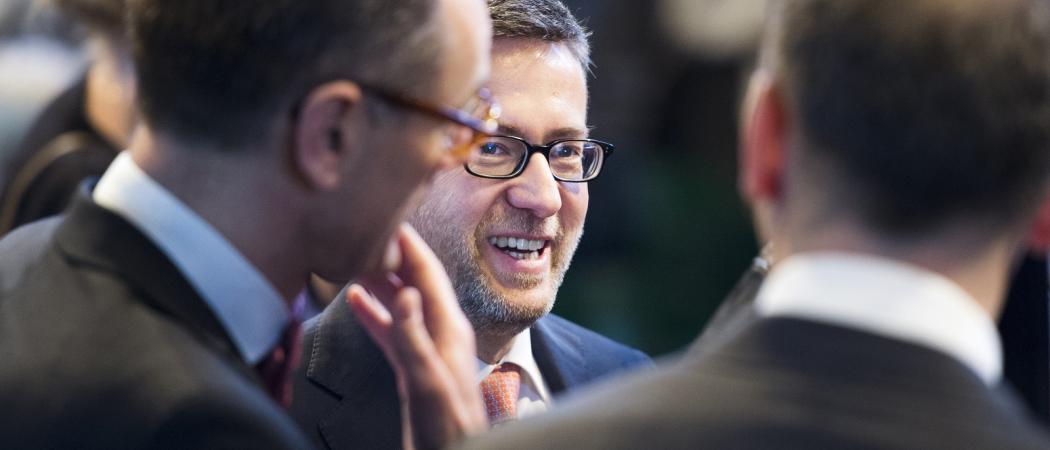Brussels-based think tank Bruegel says EU must ensure autonomy of European Research Council, find top people to run European Innovation Council and conduct more research with China

The Bruegel report outlines what the successor of commissioner Carlos Moedas (centre) should prioritise in R&D policy. Photo: European Commission
The European Commission should make its Horizon Europe research programme more open to China, according to a memo setting out priorities for the next EU administration due to take office on 1 November.
Past and current research programmes “have not been very successful in establishing links with the best science countries,” the memo drafted by think tank Bruegel says.
Horizon Europe, the EU’s biggest -ever R&D programme, which will run for seven years from 2021, is expected to offer more flexible entry terms to foreign countries, and Bruegel urges special attention for the US and China.
“Selection on the basis of excellence should become the priority for agreements with third countries, with the US and China being among the highest priorities. Links with China in particular should be strengthened,” reads the memo, which is addressed to the person chosen to succeed Carlos Moedas as EU research commissioner. Reports say incoming commission president Ursula von der Leyen may announce her new roster of commissioners as early as next week.
The EU has said it will offer China more say on setting research priorities within its new research programme, but will stop short of allowing it to join as an associate member – a status that allows countries to participate in EU research under the same conditions as member states.
“China does not appear to be an obvious candidate” for association, the EU’s director-general for research Jean-Eric Paquet said last year.
China is not known to have expressed an interest in association status, but Paquet said it would fall short of meeting the required entry criteria anyway. According to the Horizon Europe legal text, associated countries must demonstrate “fair and equitable dealing with intellectual property rights, backed by democratic institutions”.
However, the Chinese can still get involved in parts of the new programme, as long as they bring their own funding.
Cut the cost of science journals
In the world of research, the think tank is also urging Brussels to put its weight behind negotiations for cheaper subscription deals from science publishers.
“You could give the world of open science a big boost by using your power as an important funding agency to negotiate with publishers fair prices for providing open access,” the memo says. “You can also ask your colleague responsible for competition to look into pricing behaviour in this sector.”
Researchers have already complained to the Commission about how they have no choice but to pay whatever price big publishers set for journal subscriptions – with little transparency over costs.
“What should be ensured is that EU public funds designated for open research do not end up being transferred into excessive publishers’ mark-ups,” the memo says.
No further oversight of ERC
Bruegel also urges the new commission to protect the “successful formula” of the European Research Council (ERC).
“A critical ingredient…. is the autonomy and independence its scientific council has in designing grants and selecting evaluators. There is no need for further oversight of the ERC,” the memo says.
Earlier this year, tension between the agency and the commission administration that oversees it came to a head with the unexpected resignation of the director of the ERC Executive Agency, who cited changing management details that he feared could limit the agency’s flexibility.
On spending, the Horizon Europe programme should give more to climate and innovation research, the memo says.
“The urgency of the climate change challenge could easily justify even higher funding. [And] you can easily justify increased support for innovation.”
Revamp Marie Curie
Meanwhile, the popular Marie Curie scientist training scheme should get a revamp.
“Only a very small part of the current budget, itself already relatively small, is spent on individual fellowships for mobility and research-staff exchanges. Most of the budget is for doctoral training.”
The sums spent on mobility between academia and industry, and on fellowships for non-EU researchers and EU researchers outside the EU, are also minimal, the memo says. “China, in particular, is significantly underrepresented.”
The report says that most of the money in this scheme is for staff transfers within Europe and so far, exchanges involving the central and eastern countries that joined the EU in 2004 and after, have been limited.
The authors believe the European Innovation Council (EIC) can “become a reputable label of excellence”, provided it attracts top managers.
“It is critical that you install an EIC governance model like the ERC, based on a sufficiently autonomous council composed of recognised technology leaders, who can design the programme and select the evaluators,” the memo says.
The potential for the EIC to make a mark is more obvious for the early stages of financing, less so for later phases of financing, the memo adds.





 A unique international forum for public research organisations and companies to connect their external engagement with strategic interests around their R&D system.
A unique international forum for public research organisations and companies to connect their external engagement with strategic interests around their R&D system.